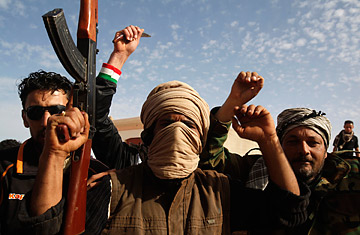
Protesters chant antigovernment slogans in the main square of Tobruk, Libya, on Feb. 22, 2011
Tobruk is about an hour and a half by car from Libya's border with Egypt, a drive through flat, sparsely populated scrubland along the Mediterranean coast. The communities along the route are scattered in low, rectangular block buildings, many painted a decaying, sand-battered white with green doors and shutters. As nightfall came to Libya on Tuesday, the towns almost disappeared into the darkness, with their electricity limited, despite many power lines. Sporadic lakes of sewage broke up fields of garbage. "You see how Libyans are living here," said my guide, Emat al-Maijri, an activist, pointing to the buildings. "And with all this oil!"
The men of Tobruk are proud to have been among the first to push Muammar Gaddafi's regime out of their city. There were only three or four fatalities here, with about 50 injured, residents say. That's because Tobruk, in Libya's far east, fell fast. It was part of the domino collapse of Libya's eastern towns — the first in the country to fall to the antigovernment protesters. "All of Libya is against Gaddafi," says Gamal Shallouf, a marine biologist turned activist in Tobruk. He says the east was the first to fall because it long felt neglected by a ruler who focused development projects on the capital and his hometown of Sert. People here also feel a closeness to Benghazi, Libya's second largest city and the site of other uprisings in the country's history. "Maybe because Benghazi started it, and so we supported Benghazi. After just two days, every town was burning. Gaddafi never cared about eastern Libya. He doesn't care about Libya at all, just his own city, Sert."
Tawfik al-Shohiby, a chemical engineering professor at the University of Tobruk, says Benghazi lies at the current uprising's center because it was the site of regime brutality in 2006. The date of the protest, Feb. 17, was announced on Facebook and chosen for a reason, he says. "You know this date in 2006 — 14 people were killed outside the Italian consulate in Benghazi," he says. "They were out protesting against the cartoons of [the Prophet] Muhammad. They were protesting, and the police killed them. The first one who died was a child." He adds, "This was our first opportunity to say no to a dictator."
But what are Libyans going to do if and when they rid themselves of Gaddafi? For one, the activists in Tobruk believe a lot more fighting will take place. Sert, parts of Tripoli and the south are considered to be under Gaddafi-loyalist control, and there are reports of intense fighting between hired mercenaries and residents. There are also reports of labor strikes on oil fields in Misla and Nafoora. But people on the border and in Tobruk say confidence is rising in the east, where Libya is under control of "the people."
But are the people really united? In speeches, both Gaddafi and his son (and assumed heir) Saif have warned that without their dynasty's firm rule, tribalism will tear the country apart. "Libya is not Egypt or Tunisia," Saif said again and again on Feb. 20. But the residents of Tobruk say the Gaddafis created the tribalism. Says Shallouf, the marine biologist: "Gaddafi made the tribes here. He made it tribal. After Gaddafi brought down our king, he established governance at the tribal level. He thought it was a good idea. But it was a devilish idea. He created tribal governments. He supported some and not others. But we didn't feel this was right. We now feel we have only one family: the Libyan family."
Still, even the activists want only so much change. Libya, they explain, is more traditional than its neighbors Tunisia and Egypt. The activists say they want to see a new government that preserves Libyan culture, not a democracy imported from elsewhere. Says al-Shohiby: "I have one soul. I will give it for this revolution — not just for money, but for freedom. We want freedom, but democracy that fits with our culture. Not just any democracy. One that respects our religion. Libya is 100% Muslim and Sunni, and 100% original Libyan. So we need to make our own democracy. We need support from outside — the U.S. and U.K. — but not to tell us what to do. We just want advice."
Shallouf wants to see a government that gives back to its people. Many others echo the complaint that the people don't see enough of Libya's oil revenues. "We have so much money, but our government makes business in Africa for Gaddafi and his sons only," says Shallouf. "I am the manager of a marine biology research center. Do you know how much the government gives me a month? Only $300. I have just one child, a girl. If I had another, I don't know what I would do."
Shallouf complains that the hands of European and American companies are too deep in Libya's oil. "O.K.," he says, "we respect all deals, but I think the money from the oil should be for us and the oil should be for us. It should go toward development. Libya needs human development. Gaddafi broke [the] sciences here, and health. And he broke the police. They made us hopeless, so that we need all kinds of development."
Al-Shohiby doesn't think the current crisis will devastate Libya's oil economy, as the Gaddafis have threatened. "Every company and country wants to work in Libya," he says. "After Gaddafi is down and the situation is better, it will be better than good." Shallouf agrees, saying, "We trust that foreign people in all countries hate Gaddafi and don't trust him because he's crazy and has made many troubles in the world with our money."
